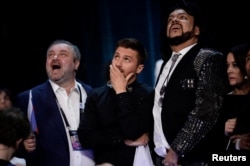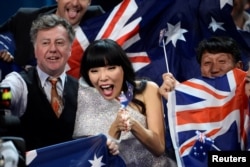Russians largely blamed politics and a new voting system for their country's loss to Ukraine at the politically charged Eurovision song contest.
Within hours after the annual, pop-song talent contest’s grand finale wrapped up early Sunday in Stockholm, Russian officials and state media were crying foul, with some of them calling the loss part of a grand Western conspiracy.
Russian lawmaker Yelena Drapeko told the state-run TASS news agency the loss was part of a propaganda war against Russia. “It's about the overall demonizing of Russia, that everything is bad here, our sportsmen are doping, our airplanes violate air spaces,” she said.
Russia’s athletics team faces a possible ban from this year’s Summer Olympic Games in Rio over insider allegations of state-sponsored doping. Meanwhile, since tensions erupted over Ukraine, Russian military planes have dramatically increased buzzing neighboring air forces and U.S. Navy ships in apparent warnings and shows of force.
Singer Susana Jamaladynova's receiving the most Eurovision points for “1944,” a song about Soviet leader Josef Stalin’s forced deportation of Crimean Tatars, was seen as a subtle rebuke of Russia’s current occupation of Crimea.
Watch related video by RFE/RL:
Jamala, as she is known, is a Crimean Tatar. Her song stood in stark contrast to those of other contestants who sang typically pop motivational songs with themes such as love, life, and togetherness.
Russia’s Sergey Lazarev was favored by many to win for his song, “You Are the Only One,” but after the votes were counted, Lazarev finished third after Australia.
At a Eurovision viewing event in Moscow after the winner was announced, Russia’s supporters blamed politics.
“And this song contest is no longer a song contest,” said Muscovite decorator Danilova.
“The victory of Ukraine was crazy. Her [amala’s] ong did not correspond to the present political situation,” she told VOA.
“The song deals with history, with the events of 1944. I understand it is good to commemorate one's ancestors and history, but here the song with such lyrics was out of place,” added Danilova.
Not everyone who attended the Eurovision gathering agreed.
Muscovite Svetlana Kharchenko, a flight attendant, said she liked the results and that the best song won.
“Of course, I supported Russia,” she told VOA. “But, I think that Ukraine has an unusual song. It’s quite unique,” said Kharchenko, who often visited Crimea as a child on family vacations.
“I like the meaning of the song because it’s unusual in Eurovision and among all the rest of the songs. And, I think the voice, of course, the voice of Jamala is incredible,” she added.
Danile, a Russian citizen with family roots in Ukraine’s Russia-backed, rebel-held Lugansk, watched the contest draped in a Ukrainian flag.
“I’m a fan of Jamala, because Jamala has fans not only in Ukraine she also has fans in Russia and I also am her fan,” he excitedly told VOA in broken English.
Australia would have won
Moscow’s morning tabloid newspapers Monday alleged the Eurovision title was “stolen” from Russia by politics and a change in the voting system.
Politics may have swayed some national juries to vote for either Ukraine or Russia based on recent alliances or tensions. Poland, Latvia, Moldova and Georgia voted for Ukraine, Greece, Belarus, and Cyprus voted for Russia.
Although Russia’s Lazarev scored the highest televotes from audiences, national juries put Ukraine on top.
Australia, a country not even in Europe, won the most votes from national juries, coming in second place after its televotes were added. Eurovision says under the previous voting system, Australia would have been the winner.
Andres Safari, the head of the Euro Fans Club of Moscow that organized the Eurovision viewing event, told VOA he was sorry to see Eurovision slide back to politics.
“They have created a conflict right now between Russia and Ukraine, though in principle it shouldn't have appeared,” said Safaria. “There was this intrigue at the end, between Russia and Ukraine, and everybody was waiting for the winner; but I think that Australia should have won,” he said.
Russian officials earlier this year failed to convince Eurovision to reject Jamala’s song for being political. Jamala has spoken out against Russia’s crackdown on Tatars since it annexed Crimea from Ukraine in March 2014.
Crimean Tatars make up about 12 percent of the Black Sea peninsula’s population and were outspoken opponents of the annexation, which was widely condemned in Europe, the United States, and the United Nations.
Amid the tension between Russia and Europe over Ukraine, Russia’s previous Eurovision entries have been booed during performances.
Lazarev told Russia’s official TASS news agency Sunday he was pleased to break the negative perception of Russian participants the past several years. “Everyone knows that, and I was warned that the audience had a highly negative response toward Russian performers despite their decent shows. This year I was supported by the audience and Europe voted for me," Lazarev said.
"This is the greatest victory in that I managed to change the attitude in such a way and set viewers to a positive mood," he added.






